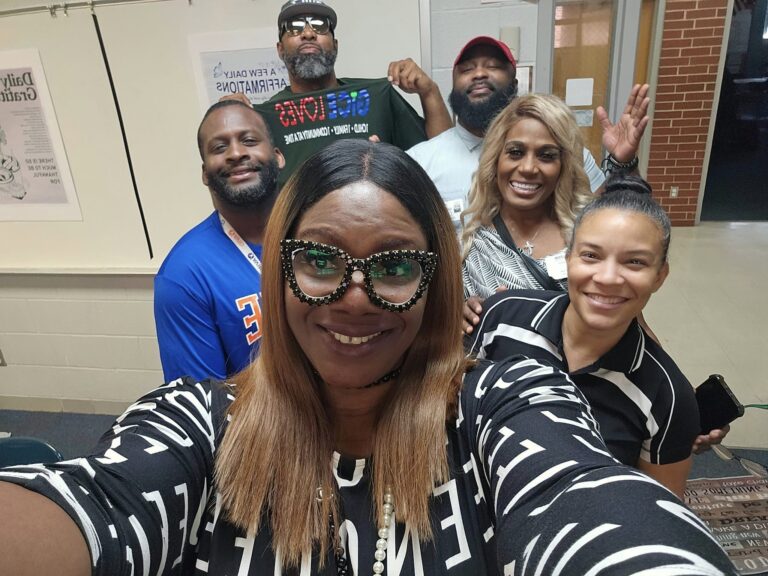The Title 1 Teaching Experience
Have you ever felt burned out, discouraged, or unappreciated while teaching in a Title 1 school? Many teachers, like you, are all too familiar with this feeling. We see you trying so hard every day to make positive changes within your classrooms. We know that feeling of the lack of support from the education system.
It can be especially challenging if essential resources such as adequate support staff or salary raises are lacking and Teacher Burnout Syndrome (TBS) often sets in.
Let’s explore the unique challenges of being an educator at a Title 1 school, discuss what we have control over to address income deficits, promote community connection, and bridge the gap between teacher’s vision/mission and our education system.
Introducing the Title 1 Teaching Experience
Picture this (although, you probably don’t have to because you’re living it)! You’ve been blessed with an opportunity to shape the lives and futures of children who, without your guidance and expertise, might not have the same chance at success. Warmly, I introduce to you the Title 1 Teaching Experience—a golden ticket to unlocking new worlds of knowledge and joy in our most vulnerable youth’s lives.
Just as a lighthouse guides ships safely to shore, your dedication and compassion will lead these children towards a life of purpose, strength, and inner confidence. By being a guiding light in their education journey, you will not only help shape them into future leaders of our world, but you will also witness the ripple effect of your impact far beyond the classroom.
Examining Teacher Burnout and How to Mitigate it
The significance of educators when it comes to shaping future generations is often overlooked. Teaching is a job that, like parenting, demands continuous devotion, passion, and emotional resilience. The phenomenon of teacher burnout is more prevalent than ever, yet largely ignored. It occurs due to a multitude of factors – from immense workload to stifling bureaucracy and lack of support.
To mitigate its impact, we must act collectively to empower our educators. It’s time to review their work-life balance, lend moral support, and offer comprehensive, constructive feedback. Whether a parent or a student, let’s remind ourselves to express our gratitude, empower our educators, and encourage them to continue nurturing our minds and fostering a love of learning.
Discussing the Income Deficit of Title 1 Teachers
As a community, it’s truly time to have a serious conversation about an issue that affects millions of children – the income deficit of Title 1 teachers. Dedicated and passionate educators face a financial struggle every day just to make ends meet. You consistently pour their hearts and souls into educating the children, who come from some of our most vulnerable communities.
It is heartbreaking to see heroes like you working so tirelessly for the betterment of our future generations. You deserve more than the financial struggle you might be experiencing.
The Global Institute for Coaches and Entrepreneurs (GICE) has been working in the Dallas/Ft. Worth school district to open up conversations that bring solutions to the income gap. We want to ensure that our Title 1 educators and administrators are treated with the respect and dignity they deserve, while being equipped with resources and tools to create generational changes.
GICE empowers phenomenal educators, who tirelessly work to foster hope, belief and opportunity to our children, through life coaching.
Understanding the Community Disconnect of Title 1 Teachers
As we dive into the world of Title 1 teachers, it’s essential to approach this conversation with compassion and determination. It becomes apparent that many educators in this field face a unique set of challenges connecting with their communities.
For instance, parents and families in these low-income areas may have different priorities due to their socioeconomic conditions, limiting communication with teachers. On the other hand, educators often struggle to relate to the particular struggles and culture experienced by students and their families.
That is why it is crucial for us as a society, to provide targeted resources and build bridges of understanding between Title 1 teachers and their communities. By establishing an open-minded dialogue, implementing mentorship programs, and even hosting community events or workshops, we can overcome these disconnects and foster stronger connections. In doing so, we can assure these brave educators become powerful change-makers who transform the lives of their students while empowering parents and the community in this significant journey.
The Gap Between Educators’ Mission and Vision and the Resources They Have Access To
Most Title 1 educators take on this career with some knowledge of the challenges and roadblocks they are about to face. But, the reality is that no one can be fully prepared, until they are placed. In spite of that, these teachers arrive armed with a purpose – a clear mission and vision for not only their students, but the future.
The gap between the mission and vision of Title 1 educators and their students, and the resources they have access to, is a major issue. Despite their dedication and passion, many find themselves in a bind when it comes to finding the necessary tools for educating their students.
Inadequate funding and lack of resources are the two main obstacles faced by Title 1 teachers. Due to budget cuts, some classrooms don’t have enough textbooks or computers for students to learn from; some schools don’t even have basic necessities such as desks and chairs.
Additionally, many Title 1 schools suffer from overcrowding due to insufficient staff, which prevents teachers from having one-on-one time with their students that can make all the difference.
Check out the strategies to bridging the gap between teachers’ mission and vision and the education system.
GICE has seen a significant change in bridging that gap in the schools they work with. With the right support and resources, our Title 1 educators can continue to make a lasting impact on their students’ lives and create positive change within their communities. Teachers who are certified as life coaches with a mental and behavioral health concentration are making waves in the classroom and community. They now have the tools and resources to create a level of support for their students that matches their passion.







